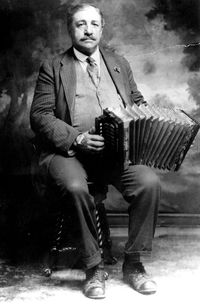Annotation:Valse-Clog des Coteaux: Difference between revisions
No edit summary |
m (Text replacement - "garamond, serif" to "sans-serif") |
||
| (One intermediate revision by one other user not shown) | |||
| Line 1: | Line 1: | ||
'''Back to [[{{BASEPAGENAME}}]]''' | '''Back to [[{{BASEPAGENAME}}]]''' | ||
---- | ---- | ||
<p><font face=" | <p><font face="sans-serif" size="4"> | ||
'''VALSE-CLOG DES COTEAUX.''' French-Canadian, Waltz-clog (3/4 time). D Major. Standard tuning (fiddle). AA'BB'A"A"'B"B"'. The waltz clog, a tap dance in ¾ time, is thought to be derived from German and British immigrants after the American Civil War; as a fad it was popular in the early 1900’s, and perfected by Bill “Bojangles” Robinson and others. In French Canada the waltz-clog is the only British inheritance in the traditional step dancing of the region. It was mostly danced in Montreal and owes its influence mainly to Montreal fiddler Jean Carignan. | '''VALSE-CLOG DES COTEAUX.''' French-Canadian, Waltz-clog (3/4 time). D Major. Standard tuning (fiddle). AA'BB'A"A"'B"B"'. The waltz clog, a tap dance in ¾ time, is thought to be derived from German and British immigrants after the American Civil War; as a fad it was popular in the early 1900’s, and perfected by Bill “Bojangles” Robinson and others. In French Canada the waltz-clog is the only British inheritance in the traditional step dancing of the region. It was mostly danced in Montreal and owes its influence mainly to Montreal fiddler Jean Carignan. | ||
<br> | <br> | ||
<br> | <br> | ||
[[File:montmarquette.jpg|200px|thumb|left|Alfred Montmarquette]] | [[File:montmarquette.jpg|200px|thumb|left|Alfred Montmarquette]] | ||
"Valse-Clog des Coteaux" is credited to accordion player Alfred Montmarquette [http://www.collectionscanada.gc.ca/gramophone/028011-1041-e.html] (1871-1944), although source Bruneau's version is somewhat different. Montmarquette did record "Valse des Coteaux" on 78 RPM in 1928 for Starr Records. | "Valse-Clog des Coteaux" is credited to accordion player Alfred Montmarquette [http://www.collectionscanada.gc.ca/gramophone/028011-1041-e.html] (1871-1944), although source Bruneau's version is somewhat different (Montmarqutte's tune starts on the second strain of Bruneau's valse-clog version). Montmarquette did record "Valse des Coteaux" on 78 RPM in 1928 for Starr Records. | ||
<br> | <br> | ||
<br> | <br> | ||
</font></p> | </font></p> | ||
<p><font face=" | <p><font face="sans-serif" size="4"> | ||
''Source for notated version'': French-Canadian accordion great Alfred Montmarquette via French-Canadian accordion player Philippe Bruneau (Québec) [Bégin]. | ''Source for notated version'': French-Canadian accordion great Alfred Montmarquette via French-Canadian accordion player Philippe Bruneau (Québec) [Bégin]. | ||
<br> | <br> | ||
<br> | <br> | ||
</font></p> | </font></p> | ||
<p><font face=" | <p><font face="sans-serif" size="4"> | ||
''Printed sources'': Bégin ('''Philippe Bruneau'''), 1993; No. 14, p. 23. | ''Printed sources'': Bégin ('''Philippe Bruneau'''), 1993; No. 14, p. 23. | ||
<br> | <br> | ||
<br> | <br> | ||
</font></p> | </font></p> | ||
<p><font face=" | <p><font face="sans-serif" size="4"> | ||
''Recorded sources'': <font color=teal>Starr 15476-B (78 RPM), Alfred Montmarquette (1928). </font> | ''Recorded sources'': <font color=teal>Starr 15476-B (78 RPM), Alfred Montmarquette (1928). </font> | ||
<br> | <br> | ||
<br> | <br> | ||
</font></p> | </font></p> | ||
<p><font face=" | <p><font face="sans-serif" size="4"> | ||
See also listing at:<br> | See also listing at:<br> | ||
See "Valse des Coteaux" at Eric Lortie's Indentitairs Québécois [http://www.mustrad.udenap.org/partitions/TQ377.jpg]<br> | See "Valse des Coteaux" at Eric Lortie's Indentitairs Québécois [http://www.mustrad.udenap.org/partitions/TQ377.jpg]<br> | ||
Latest revision as of 14:41, 6 May 2019
Back to Valse-Clog des Coteaux
VALSE-CLOG DES COTEAUX. French-Canadian, Waltz-clog (3/4 time). D Major. Standard tuning (fiddle). AA'BB'A"A"'B"B"'. The waltz clog, a tap dance in ¾ time, is thought to be derived from German and British immigrants after the American Civil War; as a fad it was popular in the early 1900’s, and perfected by Bill “Bojangles” Robinson and others. In French Canada the waltz-clog is the only British inheritance in the traditional step dancing of the region. It was mostly danced in Montreal and owes its influence mainly to Montreal fiddler Jean Carignan.

"Valse-Clog des Coteaux" is credited to accordion player Alfred Montmarquette [1] (1871-1944), although source Bruneau's version is somewhat different (Montmarqutte's tune starts on the second strain of Bruneau's valse-clog version). Montmarquette did record "Valse des Coteaux" on 78 RPM in 1928 for Starr Records.
Source for notated version: French-Canadian accordion great Alfred Montmarquette via French-Canadian accordion player Philippe Bruneau (Québec) [Bégin].
Printed sources: Bégin (Philippe Bruneau), 1993; No. 14, p. 23.
Recorded sources: Starr 15476-B (78 RPM), Alfred Montmarquette (1928).
See also listing at:
See "Valse des Coteaux" at Eric Lortie's Indentitairs Québécois [2]
Hear Alfred Montmarquette's "Valse des Coteaux" at the Virtual Gramophone [3] [4]
See the waltz-clog dance performed by Pierre Chartrand and Molly Gawler on youtube [5]
Back to Valse-Clog des Coteaux
